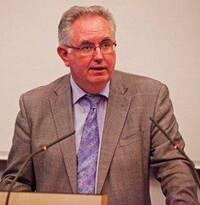
10 Nov NEJM: First Study to Apply Whole Genome Sequencing to Wide Range of Rare Diseases
MedicalResearch.com Interview with:

Professor Sir Caulfield
Professor Sir Mark Caulfield
Professor of Clinical Pharmacology
William Harvey Research Institute
Queen Mary University of London
MedicalResearch.com: What is the background for this study?
Response: Rare diseases affect 6% of the population in western nations and there are approximately 10,000 different disorders and many remain without a genomic diagnosis after usual testing during their life time. In 2013 the UK Government launched the 100,000 Genomes Project and created Genomics England to investigate the role of whole genome sequencing in rare disease, cancer and infection. Whole genome sequencing gives the most comprehensive read out of the entire genome. To do this we partnered with the National Institute for Health Research (NIHR) BioResource and 9 hospitals across England1.
Our New England Journal of Medicine paper published on the 11th November 2021 reports findings on the early rare disease participants who helped us pilot procedures and processes that would be used to enrol at scale across the NHS and revealed the potential benefits for rare disease1.
MedicalResearch.com: What are the main findings?
Response: This study is the first to apply whole genome sequencing to such a wide range of rare diseases. Each of the participants had unmet diagnostic need after usual care testing and were selected by clinicians in direct healthcare.
Whole genome sequencing increased diagnoses by 25% across 160 different rare disease categories. For eye disorders, metabolic disease, neurological syndromes and intellectual disability diagnostic rate was even higher and in some cases 40-45%. The use of whole genome sequencing enabled us to discover 14% of diagnoses that would not have been made using other tests and many of these were outside the part of the genome that codes for proteins (the genes) 1.
In our study 25% of diagnoses had immediate clinical utility changing medication, dietary or vitamin supplements and leading to additional surveillance for the proband or relatives and some of the participants became eligible for clinical trials or could make future reproductive choices as a result of our findings1.
To understand the impact of this, families who joined this programme spent 6 years (median 75 months) attending a median of 68 hospital appointments prior to diagnosis. To set this diagnostic odyssey in context their unaffected relatives attended a median of 18 appointments over 120 months from birth. In the 18 months post diagnosis the participants have fewer more focused clinical episodes. The affected participants used 183,273 episodes of hospital care via the emergency department, outpatients, inpatients and critical care at a cost of £87 million (median cost of £15,310 per participant) 1.
MedicalResearch.com: What should readers take away from your report?
Response: Our findings were used to create the National Health Service Genomic Test Directory covering use of single gene tests all the way to whole genomes. Whole genome sequencing is now available for specific disorders in the NHS where we have discovered it gives high diagnostic yields. As a result the NHS now has a National Genomic Medicine Service providing consistent & equitable access to testing across 56 million population. Our findings could enable healthcare systems to adopt whole genome sequencing to address unmet need in rare disease worldwide 1.
MedicalResearch.com: What recommendations do you have for future research as a result of this work?
Response: We are initiating a pan-rare disease re-analysis of the entire rare disease participants in the 100,000 Genomes Project where we will include multiomics (RNA and protein measurements), functional genomics and the latest analytics with the involvement of our participants at every stage. The future is a global coalition of healthcare professionals and researchers to fully realise the opportunities for patients with rare diseases and where possible create the biological insights that will enable us to develop innovative therapies where possible.
MedicalResearch.com: Is there anything else you would like to add?
Response: Mark Caulfield and Damian Smedley were seconded from Queen Mary University of London to Genomics England for part of this work.
- Citation: Smedley D., et al. The 100,000 Genomes Pilot on Rare Disease Diagnosis in Healthcare – A Preliminary Report. N Engl J Med 2021;385:1868-80. DOI: 10.1056/NEJMoa2035790.
JOIN OUR EMAIL LIST
[mailpoet_form id="5"]We respect your privacy and will never share your details.
[last-modified]
The information on MedicalResearch.com is provided for educational purposes only, and is in no way intended to diagnose, cure, or treat any medical or other condition. Always seek the advice of your physician or other qualified health and ask your doctor any questions you may have regarding a medical condition. In addition to all other limitations and disclaimers in this agreement, service provider and its third party providers disclaim any liability or loss in connection with the content provided on this website.
Last Updated on November 10, 2021 by Marie Benz MD FAAD
